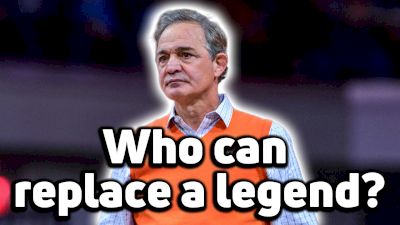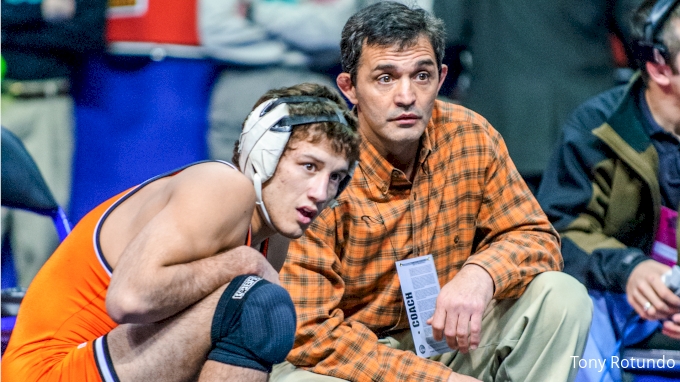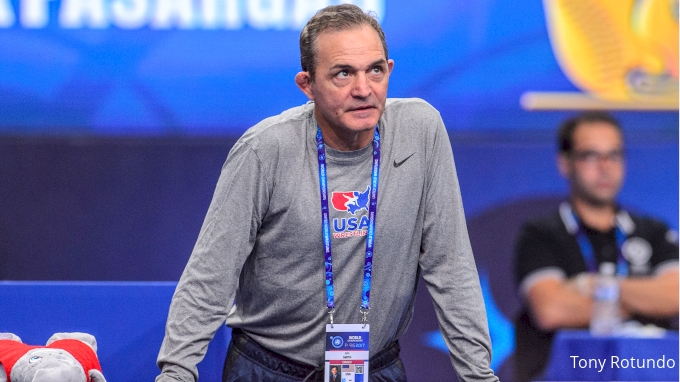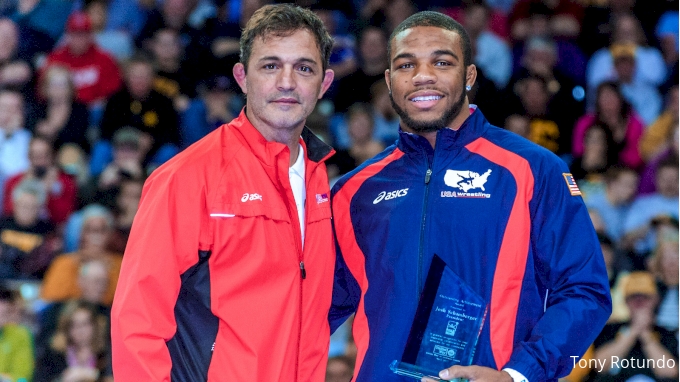John Smith's Pupils And Peers Reflect On His Legendary Career
John Smith's Pupils And Peers Reflect On His Legendary Career
John Smith made an immeasurable impact during his 33-year coaching career. His coaching colleagues share their thoughts on the retired Oklahoma State coach.

John Smith’s retirement announcement rippled across the college wrestling landscape this week. The legendary Oklahoma State coach piled up 490 dual meet victories, five national championships and 21 conference titles during his illustrious 33-year coaching career.
Beyond the numbers, though, Smith made an immeasurable impact on innumerable lives during his coaching career — and not just for the Cowboys. Several of Smith’s pupils and peers reflected this week on his influence on Oklahoma State, college wrestling and the top levels of the sport.
Reactions To The News
Army West Point coach and former Oklahoma State wrestler Kevin Ward: “We all knew he was going to retire at some point, but seeing the announcement still feels strange and honestly it feels like the sport of wrestling has already changed, even though it was just a press release. He was such a big part of wrestling and college wrestling for so long that it feels like it’s changed a little bit.
“But if I was talking about him and Oklahoma State, I’d say I’m personally just extremely grateful for what John and the rest of the staff — he had an incredible staff when I was there — what Oklahoma State, the imprint it made on me and the way it changed my life. I’m really grateful for it and he’s the one who made all that happen. He loves wrestling, he’s dedicated his life to the sport and I’m sure that’s not going to change. We all hope he has the retirement he deserves. I’m grateful for everything he’s done for the sport.”
Oklahoma State interim head coach Coleman Scott, a 2008 NCAA champion for the Cowboys: “I think the biggest thing is when he explained it and saw where he’s at, I’m just happy for him if that’s where he’s at. This guy’s earned everything he’s gotten and he deserves the right to be celebrated if that’s what he wants. He’s earned that right. Really, I’m just very happy for him and very fortunate and grateful to be a part of this program as an athlete, on staff a couple years before I left and then very fortunate and grateful to be back here for his last year, which in the moment you didn’t know. Looking back on it and thinking about the year we had and the great year being able to celebrate him.”
Wyoming coach Mark Branch, a former Oklahoma State assistant and two-time NCAA champion for the Cowboys: “I’m happy for him. He deserves some time away and a chance to enjoy other things and I’m sure he’s going to struggle letting go of his competitive nature, but in the big picture it’s good for him to be able to walk away and I know he’s going to be involved in the sport forever in one capacity or another. But the day-to-day grind of college wrestling wears on you and he has a lot of things he enjoys doing, whether it’s hunting or fishing or working at his farm and those are the things that hopefully he can focus on and enjoy now.”
North Dakota State coach and former Oklahoma State wrestler Obe Blanc: “A little bit surprised just because of the timing. But at the same time, you think about what John has done throughout his career and we’re not going to see him in the corner moving forward, so it’s a little bit of a shocker there as well.”
Oregon State coach Chris Pendleton, a two-time NCAA champion at Oklahoma State and former Cowboy assistant: “I’m just really sad, honestly. Anytime you see a legend of the sport step away it kind of gives you a big moment of reflection on how many lives he’s impacted and how many generations of wrestlers he’s inspired.”

Lessons Learned From A Legend
Scott: “Identifying one is very hard, but man, just his passion, and that’s for everything. His passion for people, his passion for this program, this university, this sport, it never wavered. This guy’s been doing things at the highest level for 40-plus years. That’s incredible. You can’t do that without consistency and without passion. Look at the way he presents himself and the way he treats people and who he is.”
Branch: “Probably that competitiveness. He’s not only a legend in the sport, but in the sport of wrestling he’s bigger than life. I came in at a unique time when he was just starting his coaching career and just walking away from his competitive career. I got to witness that transition firsthand and the fire that drove him as a competitor because I wasn’t around him as a competitor — I was right there at the end. But you saw the passion and the fire that he had and I think that really fanned the flame for my passion for wrestling. At that point in my life, wrestling was just something I did and I wasn’t for sure what my future would be and if the sport of wrestling would be a part of my future, but he had such a passion for it, such a drive for it, such an intensity for it and I think I definitely absorbed that being around him.”
Pendleton: “I was just talking about this the other day: My first year coaching under John he told me that our responsibility as coaches is to be the last line of defense for young men before they go from college to entering the real world. We were having to have a tough talk about disciplining a kid and as a young hothead coach I wanted to kick the kid off the team and John told me, ‘No, if we give up on him he might not have a good life, Chris. You’ve got to start remembering you’re the list line of defense and you can change the trajectory of somebody’s life.’”
Blanc: “The biggest thing is probably toughness and doing the work. I think those are the two things that in my time I really picked up because when you’re wanting to make World Teams and things like that it’s extremely hard and you’ve got to be tough. That was something I felt like really took off to another level when I went to Oklahoma State — having that vision and toughness to achieve.”

Smith’s Impact and Influence
USA Wrestling women’s freestyle National Team coach Terry Steiner, whose 2017 USA women’s freestyle World Team coaching staff included Smith: “When people like John Smith get involved people take notice. Not that it needed it, but (having him on the 2017 staff) gave (women’s wrestling) more legitimacy — not in general, but maybe to coaches in the U.S., sending a message to them like, ‘If John Smith can support this and get behind it, then why can you?’ I think that’s the kind of guy John is. He’s there to help and he knows the value of the sport for young kids. … It was great having him (on the staff). For the girls, his presence alone — you can leave his knowledge out of it; that’s a whole ‘nother level — but just his presence there was a confidence booster. It definitely moved us forward for sure. Sometimes people in the U.S. needed a reason to get behind this or maybe they’re fighting it and they’re like, ‘I don’t want to get involved.’ Then they see someone like John Smith get involved it changes their mindset.”
Scott: “Whether you’re an Oklahoma State fan or not, everybody that’s been watching college wrestling, it’s been with John Smith since 1985. It’s hard to imagine without him there. That’s a crazy thing to think about. For 40 years this guy’s been involved in this sport and college wrestling.
“This dude wouldn’t do things just because (the alternative) was better for the sport — or he would do something that was better for the sport even if it wasn’t best for him.”
Little Rock coach and former Oklahoma State wrestler Neil Erisman: “You will be known by the fruit you produce. Look around the country at all the outstanding men representing OSU. All of them wrestled for or with Coach. His impact is going to be more than can be even stated right now. I have so much joy for Coach and happy he got to do it on his terms.”
Missouri coach Brian Smith: “John was always great to me. He would always talk, always share knowledge. … “For me, as a young coach, I was 32, when I took over here. I was like, ‘Man, Oklahoma State is the standard, John is the guy who’s the most respected coach and he was the guy I had to strive to beat. That’s what I pointed to and (Oklahoma State) was the program we had to take down and Oklahoma State was a program we had never beaten, and he was the guy who challenged me. Always in the dual meets, they were so prepared and he was such a great coach. He’d piss me off at times because he’d intimidate those refs, but that comes from his great coaching. I’m bummed because I don’t get to compete against him again, but I have nothing but great things to say about John and the way his teams competed and the way he always had them ready.”
Nebraska coach Mark Manning: “I think John Smith is one of the best college coaches ever in the history of college wrestling. For him to do what he did as a competitor — he won six World and Olympic titles — and then to go over to coaching right away after he retired from competing and to carry that excellence on with his athletes as a coach, that’s so hard to do. A lot of great wrestlers don’t make great coaches and John became that. As a great wrestler, you have to be somewhat selfish. To be a leader of a program for 33 years and have an iconic career … Oklahoma State wrestling is better because John Smith’s there. He carried on what Myron Roderick started a long time ago, and that is Oklahoma State being a very dominant program. John Smith will be missed. I’ll miss him. I love that guy. I have a total respect for John.”
Blanc: “He was such a great motivator. He was superb. High standards and superb at everything. John had been so long retired and he would demonstrate the technique way better than anyone in the room and he was pretty keyed in, locked in. That’s part of why we admired him — he’d show up prepared and ready to go and know what he was doing. All that stuff made us want to be coaches and to follow in his footsteps and many of us have. I’m truly excited for him to move on to the next phase and excited to use what we’ve learned from him to pass to the next generation.”

John Smith Stories
Brian Smith: “I always share this story. My first year at Missouri, we didn’t qualify a guy out of the conference (tournament), but they had the old wild card (selections into the NCAA Championships). John stopped all the coaches and said, ‘We’ve got to give Missouri a spot. They’ve got to have a rep at the nationals.’ We had a couple good kids, too, who took fourth (at the Big 12 Championships). The coaches agreed on that and that was the one year I had one qualifier, and it was because of John stepping up for our program, otherwise I wouldn’t have had a guy there. … John was somebody who always saw the bigger picture. He always did what was best for Oklahoma State, but when it came to the (overall) sport, he was looking at that, too. He was the one who pushed to get us back in the Big 12. He was the biggest advocate. He would call me every year and say, ‘We’ve got to get you back. I’m working to get you back in here.’ I just respect that.”
Steiner: “He was showing (front-headlock) technique (leading up to the 2017 World Championships) and he said in his Oklahoma twang: ‘Fight me, fight me.’ The girl thought he said, ‘Bite me’ and she bit his hand and he was like, ‘What in the hell are you doing?’
“He was just John and it was great. His personality came out and he was true to himself and he didn’t pretend to know everything about working with female athletes, but he added where he could and the girls were very receptive and they were all ears and listening to every word he said. I got to know John way back. He came up to Bismarck, North Dakota for a camp when Troy and I were sophomores in college. He was still training at that time and we got to spend some time with him at camp and wrestle with him. He was around our size. It was a great. He was a humble guy. You could tell he was a great wrestler, an Olympic champ and all that, but he never changed who he was around anyone, and that’s what I really appreciate about people. Someone like John, he’s the same person whether he’s talking to a 5-year-old kid or whether he’s talking to a billionaire on the street. He’s the same person and I can really appreciate that. From that time when we were with him up in Bismarck, there’s always been a great respect for him and even though we were mostly on opposite sides of the mat, there was just a great respect and admiration for our whole generation. He was the person we all looked to and wanted to be like. Kudos to him for staying with the sport for so long and being part of so many people’s lives and I wish him the best in this next chapter. I’m just glad I got to share some time with him over the years.”
Branch: “I’ve got a lot of favorite John Smith stories. It’s kind of hard to pick them out. To be honest, my favorite memories and times with John were away from wrestling. My day-to-day life for 17 years was pretty much wrestling and John and so you only saw that one side of him 99 percent of the time. The one percent you would see him get away from wrestling and just remove himself from that intensity was the real John. Getting a chance to be around his entire family, John was just so different when it was about wrestling and you couldn’t hardly pull him away. But I think about a lot of trail rides we went on and sitting around the campfire and having a cold beer after riding a horse for six, seven, eight hours, that was probably my most enjoyable (times with) John. Seeing that side of him and seeing him relax and smile and listening to his stories about Oklahoma State wrestling and the legends he grew up with were some of my favorite times.”
Blanc: “I don’t know if there’s one. There’s different speeches and things like that, but I wouldn’t say there’s one that sticks out as much. I remember the one time when they really wanted us off social media. Some student-athletes were getting in trouble and those things and it was like, ‘Hey, I need you to get off social media.’ We were asked to delete our social media accounts and it was like, ‘This thing’s distracting, people are posting things that are getting them in trouble and you need to think about your future and what you’re putting on there.’ It was one of those things where it was like, ‘Alright, we’re getting off social media for a while.’ That was kind of cool, to be honest. At the time, it didn’t seem like the greatest, but overall it was cool.
“And I remember we used to have to give up our cell phones when we traveled and it was time for lights out. I used to remember being really upset about it and I’d set my alarm to go off at around 3 in the morning or something like that. Luckily it wasn’t (in John’s room), but it was with one of the assistants.”
Pendleton: “Probably the most mad I’ve ever been at him was my junior year. I had just beat Ben Askren by seven points in the NCAA finals and I messed up a technique at the very end of the match that would’ve gave me the major decision. I’m walking off the mat and he immediately grabs me and instead of saying, ‘Congratulations, you’re an NCAA champion,’ he goes, ‘You know, if had gotten that takedown you probably would’ve gotten the Outstanding Wrestler (award for) the tournament.’ … At first, I took it hard, but it drove me to repeat because that year it was something crazy like seven of the 10 defending champions didn’t repeat. Instead of getting a little bit full of myself and patting myself on the back it gave me something new to strive toward. If you want me to be the Outstanding Wrestler, I’ll be the Outstanding Wrestler.”
Manning: “A number of times I reached out to him. When you’re coaching someone like Jordan Burroughs and he’s trying to accomplish something John Smith did, I reached out for advice from John and John was gracious enough to always offer it.
“In 2011, USA Wrestling wasn’t where it is today. Jordan’s first time making a World Team, he had to beat a stud in Andrew Howe to make the team. He had just gotten out of college three months before. Then standing in front of him in the World semifinals was Denis Tsargush, a two-time World champ from Russia — their best wrestler. John was there in Istanbul. I told John before the match that Jordan was going to beat him. John was like, ‘(Tsargush) is so crafty and tough. I believe in Jordan, but he’s young and he’ll have to really step up.’ I really felt it in my heart that Jordan was going to step up and wear him out.
“I just remember when Jordan came off the mat and came back to the warmup area, toward Team USA’s locker room area and John was the first one there. He was so excited. He understood the moment. We hadn’t done well for a long time and we hadn’t had a performance like that and John was so happy for Jordan to knock off the Russian stud, and later that day he won a World title. I’ve never forgotten John’s joy, his belief. Him and Jordan really developed a great relationship from that moment on and John knew he was special.”
“(John would say) ‘You have to embrace being the hunted. When you’re getting hunted down by everyone in the world, you have to be better, you have to work hard.’ I knew that by watching John. … My conversations with John all the time was, ‘It’s not just the physical stuff, Mark, it’s the mental stuff and that’s what going to be the difference. You’ve got to keep developing him mentally and challenging him because you’re trying to do something no one’s ever done.’ John knew it’s hard to stay on top of the mountain. Getting to the mountain top was one thing, but then you have to stay there and it’s a whole different ballgame and there’s a lot of challenges and distractions. You have to manage prosperity and you have to manage adversity. John and I became closer during that time and I have great respect for him and call him a friend. I have high respect for John, what he’s done at Oklahoma State and just him as a person.”
Scott: “ I like the memories of watching him share true joy with his athletes and me included in part of that. You could see his emotion come out of him when those guys succeeded throughout his entire career and that’s the best part about it for me. I don’t know if that’s one story, I just think that is his story. This guy, what he gave to us was everything. He gave us everything.”